
Topics
Guests
- Ai-Jen Pooco-founder and executive director of Caring Across Generations and co-founder and president of the Domestic Workers Alliance.
Today marks the 60th anniversary of the creation of Medicare and Medicaid — and nearly one month since President Trump’s federal budget slashed nearly $1 trillion from Medicaid to extend tax cuts for the rich. The cuts could lead to tens of thousands of unnecessary deaths every year. “Medicaid has been a lifeline. And without it, people will die,” says Ai-jen Poo, co-founder of Caring Across Generations and the Domestic Workers Alliance, which helped organize a 60-hour vigil last week ahead of the anniversary as part of a broader campaign to fight back against Trump’s cuts. She highlights the role of immigrants, who make up a third of the caregiving sector, and says Trump’s crackdown on immigration hastens the dwindling of care available to the aging and elderly. “We should be adding a trillion dollars in investments in healthcare in this country and in caregiving services in this country,” says Poo. “We need to strengthen these systems and programs for the 22nd century, not gut them.”
Transcript
AMY GOODMAN: Sixty years ago today, Medicare and Medicaid were signed into law. On July 30th, 1965, President Lyndon Johnson signed into law the Social Security Amendments of 1965 at the Truman Presidential Library in Independence, Missouri. LBJ wanted to honor former President Harry Truman, who tried, but failed, to pass low-cost medical care for the elderly. At the signing ceremony, former President Truman and his wife Bess Truman were given the first two Medicare cards in the country. This is President Johnson.
PRESIDENT LYNDON B. JOHNSON: There are more than 18 million Americans over the age of 65. Most of them have low income. Most of them are threatened by illness and medical expenses that they cannot afford. And through this new law, Mr. President, every citizen will be able, in his productive years when he’s earning, to insure himself against the ravages of illness in his old age. This insurance will help pay for care in hospitals, in skilled nursing homes or in the home. And under a separate plan, it will help meet the fees of the doctors.
AMY GOODMAN: For 60 years, Medicare and Medicaid have been the bedrock of healthcare in the United States. Well, on July 4th, President Trump signed his controversial budget reconciliation bill into law. In order to extend tax cuts for the rich, the budget slashes nearly $1 trillion from Medicaid over the next decade. Seventeen million Americans could lose their health insurance overall. One estimate projects 51,000 people will die each year as a result of the cuts.
Last week, organizers held a “60 hours for 60 years of Medicaid” vigil as part of a broader campaign to fight back against these cuts. For more, we’re joined by one of the vigil’s organizers, Ai-jen Poo, executive director and co-founder of Caring Across Generations, as well as president and co-founder of the Domestic Workers Alliance. She’s joining us from the airport in Chicago.
Ai-jen, thanks so much for joining us before you get on this plane. Can you talk on this day, the 60th anniversary of signing Medicare and Medicaid into law, the dangers to these bedrock programs in the United States?
AI-JEN POO: Well, Amy, for 60 years, Americans and our families have relied on Medicaid as a safety net to catch us when and if we fall. It’s been a promise that we have made to each other and future generations, that we will be supported to take care of ourselves and our loved ones. And that promise has been broken by this cut. And what we wanted to do in our 60-hour vigil was put a human face on every single one of those trillion dollars that’s going to be cut from Medicaid.
I think people don’t realize the extent to which Medicaid is not just a healthcare program, that, in turn — including reproductive health and maternal health. Forty percent of all babies born in the United States are covered by Medicaid. But it is also a long-term care program, providing direct care for older adults and people with disabilities. And that work, that program, is more important than ever, as we have a growing aging population in our country. When LBJ signed Medicaid and Medicare into law, he had no idea that people would be living longer, baby boomers aging into retirement at a rate of 10,000 people per day, chronic illnesses like Alzheimer’s and dementia proliferating.
We are a country that needs more care than ever before, and the unmet need out there is tremendous. These cuts are going to be devastating. It is a matter of life and death. Literally, Medicaid has been a lifeline. And without it, people will die.
AMY GOODMAN: I wanted to go to Democratic Senator Chris Van Hollen from Maryland, speaking at the protest you organized, 60 hours for 60 years of Medicaid.
SEN. CHRIS VAN HOLLEN: About a trillion dollars was cut from Medicaid. That’s a trillion dollars that was going to help people with disabilities, going to help people in nursing homes, going to help people struggling with substance use challenges, going to help Americans in need, because that was the compact that we made. And so, when you take a trillion dollars out of that important healthcare support network to give a tax cut to billionaires, people need to know about what happened.
AMY GOODMAN: So, that’s Senator Chris Van Hollen. Ai-jen Poo, can you talk about elder care more in detail, the aging population in this country, largely immigrant workforce that cares for them, the combined impacts of the Medicaid cuts and the crackdown on immigration?
AI-JEN POO: Yes. So, every day, the baby-boom generation ages into retirement at a rate of 10,000 people, and because of advances in technology, we are living longer than ever before, an average of 20 to 30 years longer than when Medicaid and Medicare were first signed into law. So we’ve essentially added an entire generation onto our lifespan without adapting our systems or our policies to support it.
And the system in place is Medicaid. Literally, Medicaid is the largest payer of long-term care in our country. Sixty-nine percent of all direct care worker wages, the wages of the workers who we count on to take care of our aging parents and our disabled loved ones, comes from Medicaid. There are already 700,000 people who are on waiting lists for Medicaid home and community-based services. That means the care and assistance that older people and disabled people need in order to stay in their homes, connected to their communities. With these cuts, all of that infrastructure, all of that is at stake.
Now, when it comes to immigrants, immigrants are a third of our home care workforce. Literally, 32% of our home care workforce is immigrant. And there is no way that we will meet this country’s need for care without a strong immigrant workforce. And it is an all-hands-on-deck situation. When the number of people over the age of 85 is going to double by the year 2040, we need immigrants. We need non-immigrants. We need friends, family, neighbors — everyone — to help care for the people we love. And we should be embracing the fact that there are so many immigrants who want to do this work, who see it as a calling, not terrorizing them and their families and deporting, separating families, creating a hostile environment where people are afraid to get on public transportation to see their clients, people are afraid to go to work. And these are people who have status. And a whole bunch of people are about to lose their temporary protected status. So, in places like Florida, where a huge percentage of the workforce are immigrants who are here working legally on their protected status, their temporary status, this administration is revoking that status, and we’re about to lose a huge amount of the workforce and infrastructure we rely on for dignity and quality of life for older people and people with disabilities.
AMY GOODMAN: So, you have a trillion dollars being cut from these essential programs to pay for trillions of dollars in tax cuts for the wealthiest Americans. This weekend, you held a vigil. Do you see this as a done deal? And on this landmark anniversary of Medicaid and Medicare — 60 years ago, it was signed — can you talk about the movement that achieved Medicaid, and what you see needs to happen now?
AI-JEN POO: The movement that achieved Medicaid is a movement of families, of older people, of people with disabilities and family caregivers of workers, working-class people, who organized together to say, “We deserve in this country, the wealthiest country in the world, to have a safety net of care.”
And that is exactly the coalition that is coming together now, that has been coming together since COVID, to demand that we build the kind of workforce and programs and assistance that our families desperately need in this country. And frankly, we should not be having to stand vigil for 60 hours for the bare minimum, which is what we had. We should be adding a trillion dollars in investments in healthcare in this country and in caregiving services in this country, as opposed to cutting it.
And so, no, this is not a done deal, because I have seen time and time again the way that everyday people and our everyday acts of courage and our decisions to tell our stories, to take our — take action, to stand vigil for however long it takes, to march, to stand up, that those acts of courage are what eventually makes history in this country. And there’s already an effort to cancel the cuts, to repeal these cuts, and there has been a long-standing effort that is building to put into place the kind of care system we actually need and deserve, building on Medicaid and Medicare and Social Security. We need to strengthen these systems and programs for the 22nd century, not gut them.
AMY GOODMAN: Ai-jen Poo, I want to thank you for being with us, co-founder and executive director of Caring Across Generations and co-founder of the National Domestic Workers Alliance, nationally recognized expert on elder and family care, as well as the future of work and immigration.


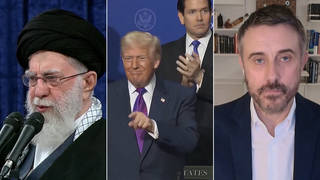
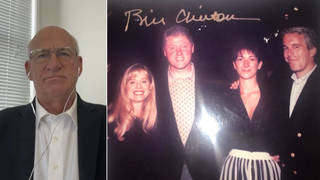
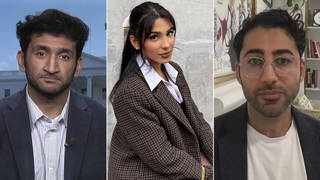





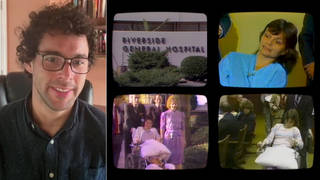
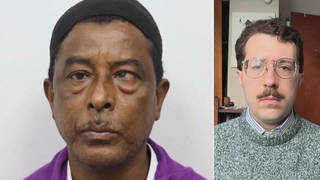

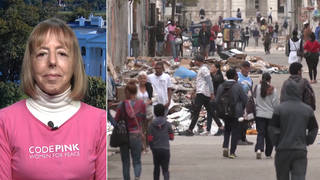
Media Options